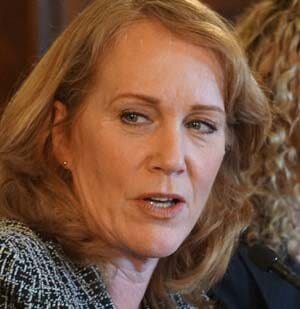Search Posts
Recent Posts
- Bed Bug Awareness: At home, hotel rooms, dorms, vacation rentals, only 29% can identify a bed bug June 8, 2025
- A crack in the foundation – Michael Morse June 8, 2025
- Ask Chef Walter: Ultra processed foods – Chef Walter Potenza June 8, 2025
- Rhode Island Weather for June 8, 2025 – Jack Donnelly June 8, 2025
- Vinny Paz to be inducted TODAY into the International Boxing Hall of Fame – CES Boxing June 7, 2025
Categories
Subscribe!
Thanks for subscribing! Please check your email for further instructions.

Director of RI BHDDH to Step Down
By Gina Macris
Rebecca Boss, Director of the Rhode Island Department of Behavioral Healthcare, Developmental Disabilities and Hospitals (BHDDH) for three and a half years, will step down at the end of this month – in three weeks – to pursue “new opportunities,” according to a departmental announcement December 11.
As director, Boss has supervised the state’s services for adults with developmental disabilities, mental illness, and substance abuse disorders. She has brought stability and effective leadership to the Division of Developmental Disabilities, becoming actively engaged in implementing a 2014 Olmstead federal civil rights consent decree, which calls for a transformation of daytime services for some 4,000 adults with developmental disabilities over a 10-year period.
During her tenure, Rhode Island has emerged as a national model for its response to the opioid crisis, and BHDDH has begun a campaign to combat the stigma of mental illness and substance. But correcting chronic shortcomings at the state hospital has proved problematic. Early in Boss’ tenure, the Eleanor Slater Hospital in Cranston nearly lost its accreditation. And last month, state and federal inspectors found widespread deficiencies in standards of care at the Zambarano unit of the hospital in Burrillville.
In a statement, Boss said, “I have truly enjoyed the 15 years I have spent at the Department of Behavioral Healthcare, Developmental Disabilities and Hospitals serving some of Rhode Island’s most vulnerable individuals.”
“I’m grateful for the opportunity I’ve had to work for the Governor and the people of this state. We’ve built an amazing team of compassionate staff who are dedicated and committed to this work,” she said.
Boss, previously the department’s top official in behavioral healthcare, became acting director in mid- 2016, succeeding Maria Montanaro, and was confirmed by the Senate in May, 2017.
Governor Raimondo said, “Becky Boss is a dedicated public servant, a compassionate leader, and a champion for Rhode Island’s most vulnerable residents.”
“I’m grateful for her 15 years of service to our state, especially her work as Director of BHDDH the past three and a half years. There’s no question that Rhode Island has benefitted from her leadership,” Raimondo said in a statement.
State Sen. Louis DiPalma, D-Middletown, the General Assembly’s most prominent advocate for people with developmental disabilities, said Boss is well respected and “will be missed.” In his 11 years in the Senate, DiPalma said, she is the only gubernatorial nominee he has testified for.
A BHDDH spokesman said the details of Boss’ “next steps will be forthcoming.” The search for a new director will begin immediately, he said. The spokesman could not immediately say whether there will be an interim director. Boss’ annual salary is $141,750.
In the field of developmental disabilities, Boss is leaving in the middle of an 18-month long rate review and analysis of the BHDDH fee-for-service reimbursement system for private service providers. The existing payment methods, enacted in 2011, have been criticized both by the U.S. Department of Justice and the former court monitor in the consent decree case.
Another big initiative underway in the Division of Developmental Disabilities is an effort to reach consensus with the community on the parameters of third-party case management which would satisfy rules of the federal Centers for Medicare and Medicaid Services for programs of care that are free of conflict among funding interests, direct service providers and case managers. The bureaucratic name for the initiative is “Health Home,” but it is neither a home nor a health care center.
Gina Macris is the founder of Developmental Disability News, which covers the long-term impact of a landmark 2014 Consent Decree between the U.S. Department of Justice and the State of Rhode Island, as well as a related Interim Settlement Agreement between the DOJ and the City of Providence signed in 2013.
Macris is a career journalist with 43 years’ experience as a reporter for the Providence Journal in Providence, RI. She retired in 2012. During her time at the newspaper, she wrote two series about her first-born son, Michael M. Smith. Both series won prizes from the New England Associated Press News Executives Association. Michael, now in his 30s, appears on the cover page, in front of the Rhode Island State House.
Photo: Rebecca Boss, by Anne Peters
